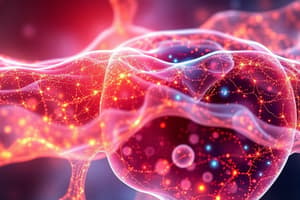Podcast
Questions and Answers
What is the main function of the phospholipid bilayer in the cell membrane?
What is the main function of the phospholipid bilayer in the cell membrane?
- To provide protection against the external environment (correct)
- To facilitate cell signaling and recognition
- To regulate the movement of substances in and out of the cell
- To generate energy for the cell through active transport
What type of transport involves the movement of substances against their concentration gradient using energy input?
What type of transport involves the movement of substances against their concentration gradient using energy input?
- Fluidity
- Semipermeability
- Passive transport
- Active transport (correct)
What is the term for the ability of the cell membrane to control what substances can pass through?
What is the term for the ability of the cell membrane to control what substances can pass through?
- Permeability
- Semipermeability
- Selectivity (correct)
- Fluidity
What type of proteins are embedded within the cell membrane and span its entire width?
What type of proteins are embedded within the cell membrane and span its entire width?
What is the function of the cell membrane in regards to cell signaling?
What is the function of the cell membrane in regards to cell signaling?
Flashcards are hidden until you start studying
Study Notes
Cell Membrane
Structure:
- Phospholipid bilayer: composed of two layers of phospholipid molecules with their hydrophilic (polar) heads facing outwards and hydrophobic (non-polar) tails facing inwards
- Embedded proteins: integral proteins (transmembrane) and peripheral proteins (attached to the surface)
Functions:
- Semipermeability: regulates the movement of substances in and out of the cell
- Protection: maintains cell shape and provides a barrier against external environment
- Cell signaling: proteins in the membrane can receive and transmit signals
- Cell recognition: unique proteins on the surface of the membrane allow cells to recognize each other
Properties:
- Fluidity: the ability of the membrane to change shape and move freely
- Permeability: the ability of substances to pass through the membrane
- Selectivity: the ability of the membrane to control what substances can pass through
Transport across the membrane:
- Passive transport: movement of substances down their concentration gradient without energy input (e.g. diffusion, osmosis)
- Active transport: movement of substances against their concentration gradient using energy input (e.g. carrier proteins, pumps)
Studying That Suits You
Use AI to generate personalized quizzes and flashcards to suit your learning preferences.




